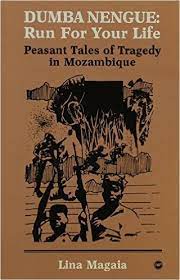Library Weekly
The ASCL's Library Weekly is our library’s weekly spotlight on African people and events. Inspired by the SciHiBlog, this service is based on information retrieved from Wikipedia and Wikidata and is completed with selected titles from the ASCL Library Catalogue.
N.B. The weeklies are not updated and reflect the state of information at a given point in time.
Library Weekly archive
Lina Magaia
 On 27 June 2011, Mozambican writer, journalist and political activist Lina Júlia Francisco Magaia died in Maputo.
On 27 June 2011, Mozambican writer, journalist and political activist Lina Júlia Francisco Magaia died in Maputo.
Lina Magaia was born in Maputo in 1940. While still at school she joined the Mozambican Liberation Front and was imprisoned for three months for political activities. She was one of the first Mozambican women to receive a scholarship to study abroad, earning a BSc degree from the University of Lisbon; she subsequently went to Tanzania for military training and in 1975 became a member of the FRELIMO liberation army. In 1980, she was involved with the "Green Zones" project of the Organization of Mozambican Women that was aimed at supplying food to the urban areas. Two years later she went to Manhiça in Maputo Province, where she became deputy director for the Maragra state sugar farm. In 1986, she became director of agricultural development for Manhiça District, but her work was to come under attack by the militant resistant movement RENAMO during the post-Independence internal conflicts.
Her books Dumba Nengue (1987; published in English as Run For Your Life) and Duplo massacre en Moçambique (1989; Double Massacre in Mozambique) draw on eyewitness accounts from survivors of atrocities in the Mozambican Civil War, and contain gruesome episodes illustrating the savage nature of the war and of the apartheid regime's surrogate force, the RENAMO rebels. A third book, Delehta (1994), set during the war, is part fiction, part documentary. Magaia's final work was Recordacoes da Vovo Marta ("Memories of Grandma Marta"), published in 2011, and based on lengthy interviews with one of Mozambique's oldest women, 99-year-old Marta Mbocota Guebuza, mother of former Mozambican President Armando Guebuza.
(Source: Wikipedia)
Selected publications
Delehta : pulos na vida / Lina Magaia. - [S.l.] : Editorial Viver [etc.], [1994]
Duplo massacre em Moçambique / Lina Magaia. - [Maputo] : Cadernos Tempo, 1989
Dumba nengue: Run for your life : peasant tales of tragedy in Mozambique / Lina Magaia. - Trenton, N.J. : Africa World Press, 1988
Publications on Lina Magaia and her work
Em que língua se escreve a dor? Processos de recriação linguística na obra de Lina Magaia / Ana Teixeira. - Repositório do ISCTE-IUL, 2011
http://hdl.handle.net/10071/2992
Ficcionar a história : Género em contexto de guerra na novelística de Lina Magaia / Ana Luisa Teixeira.
In: e-scrita, v. 2, n. 5 (2011)
https://revista.uniabeu.edu.br/index.php/RE/article/view/165
Mother Africa, Father Marx : women's writing of Mozambique, 1948-2002 / Hilary Owen. - Lewisburg : Bucknell University Press, 2007
Seasons of harvest : essays on the literatures of lusophone Africa / Niyi Afolabi; Don Burness. - Trenton, NJ [etc.] : Africa World Press, 2003
Building a bridge: Reconciling European and African world-views in the works of contemporary Mozambican women writers / Ana Luisa Teixeira. - ProQuest Dissertations Publishing, 2001
Mozambique: the revolution and the bandits : an interview with Lina Magaia / Nancy Murray.
In: Race & class : the journal of the Institute of Race Relations , vol. 30, no. 4, p. 21-29, 1988/89
Timeline of Mozambican women writers via DBpedia and Wikidata

